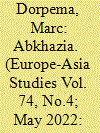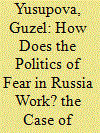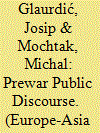| Srl | Item |
| 1 |
ID:
185339


|
|
|
|
|
| Summary/Abstract |
This article seeks to nuance previous conceptions of the 1992 Abkhazian conflict by developing an alternative framework for understanding what is commonly known as ‘ethnic’ war. The resulting ‘non-framework’ conceptualises ethnicity and its mobilisation through a combination of constructivist and instrumentalist readings of ethnicity and nationalism with a radically contingent understanding of events. Creating a novel explanatory vector, this approach questions the nature of generalisable frameworks in themselves, suggesting the case of Tatarstan as a comparative example. To this extent, the model developed here suggests the analytical weakness of ‘ethnic’ war as an overarching category and urges us to treat each case within its own causal matrix.
|
|
|
|
|
|
|
|
|
|
|
|
|
|
|
|
| 2 |
ID:
185335


|
|
|
|
|
| Summary/Abstract |
This article contributes to the study of governmentalities of the late twentieth century with regard to the proliferation of computers and information technology. Based on archival materials and oral history interviews, this study reconstructs and analyses the story of Franco–Soviet cooperation in the field of economics from the late 1950s to the 1980s, which was initially motivated by a common interest in promoting planning methods, but was later recast as a dialogue dominated by technical issues of information processing and communication and ultimately became part of a commercial strategy to support the French and Eastern European computer industries.
|
|
|
|
|
|
|
|
|
|
|
|
|
|
|
|
| 3 |
ID:
185338


|
|
|
|
|
| Summary/Abstract |
The article examines the social movement of ethnic minorities in defence of republican state languages in ethnic regions of the Russian Federation in the context of politics of fear. In particular, the article focuses on how the repressive context shapes this social mobilisation both in offline and online domains. The article offers a detailed description of responsive as well as pre-emptive and visible as well as covert repressions aimed at ethnic activists and explains how these repressive practices change the nature of dissent, pushing it online and thus inadvertently leading to the development of grassroots activism. It also suggests that the repressive turn in Russia started long before the poisoning of Aleksei Naval’nyi in August 2020.
|
|
|
|
|
|
|
|
|
|
|
|
|
|
|
|
| 4 |
ID:
185341


|
|
|
|
|
| Summary/Abstract |
This article deploys national anthem and national currency as analytical lenses to disentangle the connection between symbolic politics and nation-building, national identity formation and regime legitimation in Kazakhstan. The study emphasises the role of national symbols—in particular, the national anthem and national banknotes—as important elements of a larger discourse about the nature of Kazakh national identity. The work argues that both the Kazakh national anthem and national currency tenge do not only serve as the main attributes of statehood and economic independence; rather their significance stems from their role as crucial elements in the nation-building process.
|
|
|
|
|
|
|
|
|
|
|
|
|
|
|
|
| 5 |
ID:
185336


|
|
|
|
|
| Summary/Abstract |
We studied prewar public discourse by analysing the origin, content and sentiment of more than 4,000 letters written by people from all walks of life and published in the Belgrade broadsheet Politika loyal to the regime of Slobodan Milošević during the three years directly preceding the Yugoslav wars. Our analysis combined lexicon-based tools of automated topic and sentiment analysis with data on the sociodemographic characteristics of the letter writers and their localities. The results of our analysis show the importance of the politicisation of a history of violence in shaping public discourse in the run-up to war.
|
|
|
|
|
|
|
|
|
|
|
|
|
|
|
|
| 6 |
ID:
185337


|
|
|
|
|
| Summary/Abstract |
Why does Russia seem simultaneously powerful and weak? This article finds the answer in a geopolitical analysis of the structural incentives for and impediments to Russian alliance policy that vary across regions in ways that elude realist, liberal and constructivist explanations of Russia’s conduct. We demonstrate that those explanations miss fundamental changes in Russia’s geographical position after the collapse of the USSR and the emergence of new threats and opportunities. We model the three strategic environments in which Russia acts: its immediate post-Soviet neighbourhood; more distant regions of the Eurasian continent, such as the Middle East and East Asia; and the sphere of global security issues. Building on theories of alliance behaviour, we show how the balance of threats in those strategic environments influences Russia’s political and military policies in different regions in ways not captured by dominant theories or the narratives that inform policy debates.
|
|
|
|
|
|
|
|
|
|
|
|
|
|
|
|
| 7 |
ID:
185334


|
|
|
|
|
| Summary/Abstract |
During the years of the war between the Soviet Union and Nazi Germany, the Stalinist system of rule changed. Under the extreme circumstances of war, the practices of collective leadership expanded at the highest levels of power, while regional governance and state ministries were decentralised. An important aspect of this process of change was the revision of Stalin’s relationship with the military leadership. This article examines three interrelated phenomena central to the reconstruction of Stalin’s trust in his generals. The first is the evolution of the policy of repression from arrests and executions to demotions. The second is the relaxation of political control together with the elevation of the status of the army command. The third is a shift in strategies for addressing the dictator’s dilemma, that is, the contradictions between the growing influence of those who carry out orders (in this case, military leaders) and the further consolidation of Stalin’s sole authority.
|
|
|
|
|
|
|
|
|
|
|
|
|
|
|
|